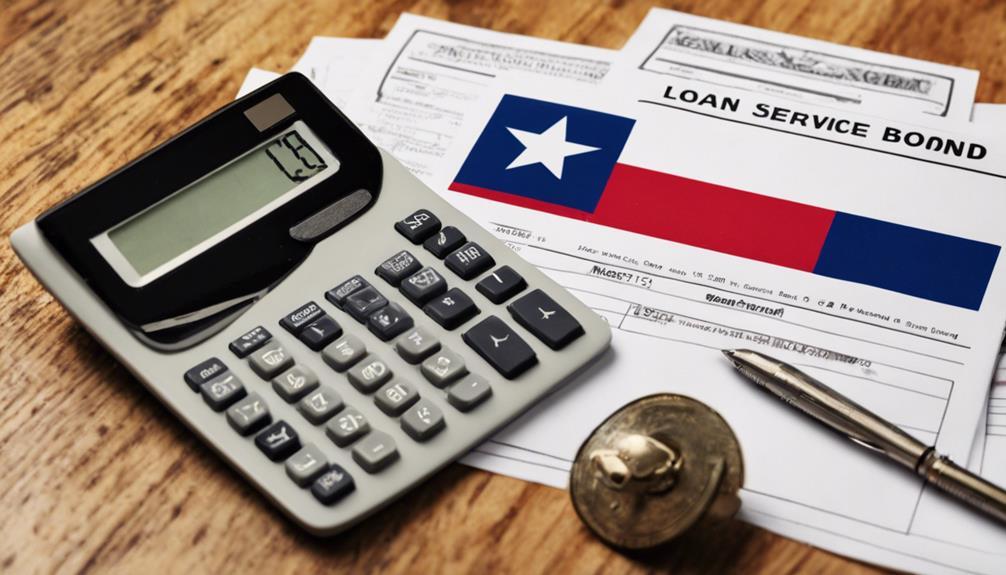If you're involved in the mortgage industry in Texas, understanding the Texas Residential Mortgage Loan Servicer Bond is essential. This bond not only protects consumers but also serves as a critical component of your business's credibility. By ensuring compliance with state regulations, you're safeguarding both your operation and your borrowers' interests. But what exactly does it take to obtain this bond, and what happens if you don't? The implications for your business could be significant, and exploring these aspects can provide clarity on your responsibilities.
What Is a Loan Servicer Bond?

A loan servicer bond is a type of surety bond that ensures compliance with state regulations for mortgage loan servicers. When you operate as a mortgage loan servicer, this bond acts as a safeguard, protecting both consumers and the state.
It's a way to guarantee that you'll follow the rules and handle funds responsibly. In many states, including Michigan, surety bonds are crucial for facilitating business operations and ensuring compliance with regulations, especially in the financial sector surety bonds in Michigan.
If you fail to adhere to these regulations, the bond provides a financial remedy for those affected. This means that if a borrower suffers due to your negligence or misconduct, they can file a claim against the bond for compensation.
Essentially, the bond holds you accountable, encouraging ethical practices within the industry.
Obtaining a loan servicer bond isn't just a regulatory requirement; it also builds trust with your clients. By having this bond in place, you demonstrate your commitment to professionalism and compliance.
It can help you establish credibility as a mortgage loan servicer, making it easier for clients to choose you over competitors.
Importance of the Bond
Frequently overlooked, the importance of the Texas residential mortgage loan servicer bond can't be understated. This bond serves as a safety net, protecting consumers from potential mismanagement or unethical practices by loan servicers. By having this bond in place, you can feel assured that there's a layer of financial security backing the services you receive.
Furthermore, obtaining a bond can also help you navigate various Texas Surety Bonds that may be relevant to your business operations.
Additionally, the bond promotes trust and credibility within the mortgage industry. It shows that you're committed to upholding ethical standards and regulatory compliance, which can significantly enhance your reputation among clients and peers. When you carry this bond, it signals to borrowers that you prioritize their interests and are willing to take responsibility for your actions.
Moreover, having a Texas residential mortgage loan servicer bond is often a legal requirement. Failing to maintain this bond can lead to severe consequences, including fines, legal action, or even loss of your license.
In a competitive market, ensuring you have the bond not only helps you stay compliant but also sets you apart, demonstrating your professionalism and dedication to responsible lending practices. Overall, this bond is essential for safeguarding your business and ensuring a trustworthy relationship with your clients.
Who Needs the Bond?

Understanding who needs the Texas residential mortgage loan servicer bond is crucial for anyone involved in the mortgage industry. If you're a mortgage loan servicer in Texas, you're required to obtain this bond.
It's essential for protecting consumers and ensuring that you follow state regulations, especially considering the diverse types of bonds available for various business operations, including surety bond services.
This bond is particularly important for entities or individuals who handle mortgage payments, manage escrow accounts, or oversee loan modifications. If you're managing a portfolio of residential loans, whether you're a company or an independent contractor, you'll need this bond to operate legally in Texas.
Additionally, if you're a new servicer entering the Texas market, securing the bond is one of the first steps you should take. It not only demonstrates your commitment to ethical practices but also helps build trust with borrowers.
Even if you're already established, ensure your bond is current to avoid any legal issues that could arise from operating without it.
Ultimately, understanding your obligation to have this bond in place will keep your business compliant and protect the interests of the homeowners you serve.
Bond Requirements in Texas
When it comes to bond requirements in Texas, it's essential for mortgage loan servicers to be aware of specific regulations.
In Texas, you must obtain a residential mortgage loan servicer bond to operate legally. This bond acts as a safeguard for consumers, ensuring that you adhere to state laws and ethical practices while servicing mortgage loans.
The required bond amount typically stands at $100,000, though it can vary based on your business size and the number of loans serviced. You'll need to maintain this bond for the duration of your licensing period, and it must be issued by an authorized surety company in Texas.
Additionally, if you cause a financial loss to a borrower due to misconduct or negligence, this bond can provide a source of recovery.
It's crucial to understand that you'll face potential penalties if you fail to meet these bond requirements, including fines or the loss of your license.
How to Obtain the Bond

To obtain a Texas residential mortgage loan servicer bond, you'll need to follow a few key steps.
First, start by gathering all necessary documentation. This typically includes your business license, financial statements, and any other relevant information that demonstrates your credibility and financial responsibility.
Next, reach out to a reputable surety bond provider or agency. They'll guide you through the application process and help you understand the specific requirements for your situation.
Be prepared to answer questions about your business practices and financial history, as this information is crucial for the underwriting process.
Once your application is submitted, the surety company will assess your risk, which may involve a credit check.
After approval, you'll receive a bond quote, which outlines the terms and conditions. If you agree to the terms, you'll need to sign the bond agreement.
Costs Associated With the Bond
The costs associated with obtaining a Texas residential mortgage loan servicer bond can vary significantly based on several factors.
First, your credit score plays a crucial role. If you have a strong credit history, you'll likely pay a lower premium. On the other hand, a lower credit score can lead to higher costs.
Another factor is the bond amount required. In Texas, the bond amount can be anywhere from $50,000 to $500,000, depending on your business volume and the specific requirements of your license. The larger the bond, the higher your premium will be.
Additionally, the bond provider's pricing structure may differ. Some companies offer competitive rates, while others might charge more based on their underwriting guidelines. It's always a good idea to shop around for quotes to find the best deal.
Lastly, consider any additional fees, such as application fees or service charges, which can also affect the total cost.
Duration and Renewal Process

A Texas residential mortgage loan servicer bond typically has a duration of one year. This timeframe means you'll need to keep track of your bond's expiration date to ensure compliance with state regulations.
As the bond nears its expiration, it's crucial to initiate the renewal process in a timely manner to avoid any lapses in coverage. Renewing your bond generally involves contacting your surety provider to discuss your needs and any changes in your circumstances.
They may require updated financial information or a review of your business practices. Once you've submitted the necessary documentation, the surety will assess your application and determine whether to renew the bond and at what rate.
If everything checks out, you'll receive a new bond that reinstates your coverage for another year. Make sure to review the terms and conditions of the renewed bond, as they may differ slightly from the previous one.
Benefits to Consumers
Maintaining a Texas residential mortgage loan servicer bond not only helps you operate legally but also brings significant benefits to consumers. For starters, it instills confidence in your clients. When consumers see that you're bonded, they feel assured that you're committed to ethical practices and financial responsibility. This bond acts as a safety net, ensuring you adhere to state regulations and industry standards.
Additionally, the bond protects consumers in case of any wrongdoing on your part. If you fail to meet your obligations, consumers have a means to claim compensation for any losses they incur. This added layer of protection promotes trust in your services and can enhance your reputation in the market.
Moreover, being bonded can give you a competitive edge. Consumers often prefer working with licensed and bonded servicers, knowing they're dealing with professionals who prioritize accountability. This not only helps you attract more clients but also fosters long-term relationships built on trust.
Consequences of Non-Compliance

Failing to comply with the requirements of your Texas residential mortgage loan servicer bond can lead to serious repercussions.
First, you could face hefty fines imposed by regulatory authorities. These financial penalties not only strain your business but can also damage your reputation in the industry.
Additionally, non-compliance might result in the suspension or revocation of your mortgage loan servicer license. Losing your license means you can't legally operate, which could halt your income and force you to close your business.
You could also face legal actions from consumers or regulatory bodies. This might include lawsuits that could lead to further financial losses and even more reputational damage.
Moreover, if a claim is made against your bond due to your non-compliance, you'll be responsible for covering the costs. This could lead to increased premiums or difficulties obtaining a bond in the future.
Ultimately, staying compliant isn't just about avoiding penalties; it's about maintaining your credibility and ensuring the long-term success of your business.
Make sure you understand and adhere to all bond requirements to prevent these serious consequences.
Key Takeaways for Loan Servicers
Understanding the importance of compliance can help you avoid the serious consequences associated with non-compliance. As a loan servicer in Texas, it's crucial to stay informed about the regulations governing your industry. Familiarize yourself with the Texas Residential Mortgage Loan Servicer Bond requirements, as this bond serves as a safety net for consumers and protects you from potential claims.
Make sure you maintain accurate records and documentation for all transactions. This practice not only strengthens your compliance efforts but also helps you respond effectively to audits or inquiries.
Regular training for your staff on compliance matters can further mitigate risks, ensuring everyone understands their responsibilities. Establish a robust compliance program, including regular assessments to identify and rectify any vulnerabilities in your operations.
Pay close attention to any changes in state or federal laws, as staying updated can help you remain compliant. Lastly, consider seeking legal advice or partnering with compliance experts to navigate complex regulations.
Conclusion
In conclusion, securing a Texas Residential Mortgage Loan Servicer Bond is vital for your operations. It not only ensures you're compliant with state regulations but also builds trust with your clients. By protecting consumers against negligence, you enhance your reputation in the industry. Remember to stay informed about the bond requirements and renewal process to avoid any penalties. Prioritizing this bond is a smart move that sets you apart as a responsible loan servicer.


